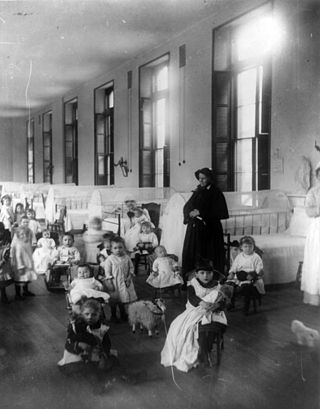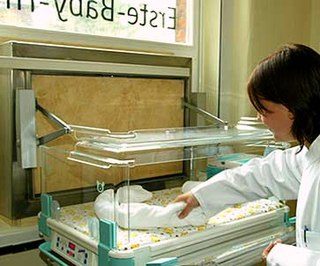Related Research Articles

Adoption is a process whereby a person assumes the parenting of another, usually a child, from that person's biological or legal parent or parents. Legal adoptions permanently transfer all rights and responsibilities, along with filiation, from the biological parents to the adoptive parents.
Baby farming is the historical practice of accepting custody of an infant or child in exchange for payment in late-Victorian Britain and, less commonly, in Australia, New Zealand and the United States. If the infant was young, this usually included wet-nursing. Some baby farmers "adopted" children for lump-sum payments, while others cared for infants for periodic payments.

A parent is either the progenitor of a child or, in humans, it can refer to a caregiver or legal guardian, generally called an adoptive parent or step-parent. The gametes of a parent result in a child, a male through the sperm, and a female through the ovum. Parents are first-degree relatives and have 50% genetic meet. A female can also become a parent through surrogacy. Some parents may be adoptive parents, who nurture and raise an offspring, but are not related to the child. Orphans without adoptive parents can be raised by their grandparents or other family members.

An orphanage is a residential institution, total institution or group home, devoted to the care of orphans and children who, for various reasons, cannot be cared for by their biological families. The parents may be deceased, absent, or abusive. There may be substance abuse or mental illness in the biological home, or the parent may simply be unwilling to care for the child. The legal responsibility for the support of abandoned children differs from country to country, and within countries. Government-run orphanages have been phased out in most developed countries during the latter half of the 20th century but continue to operate in many other regions internationally. It is now generally accepted that orphanages are detrimental to the emotional wellbeing of children, and government support goes instead towards supporting the family unit.

Surrogacy is an adoption arrangement, often supported by a legal agreement, whereby a woman agrees to childbirth on behalf of another person(s) who will become the child's parent(s) after birth. People pursue surrogacy for a variety of reasons such as infertility, dangers or undesirable factors of pregnancy, or when pregnancy is a medical impossibility.

Trafficking of children is a form of human trafficking and is defined by the United Nations as the "recruitment, transportation, transfer, harboring, and/or receipt" kidnapping of a child for the purpose of slavery, forced labour, and exploitation. This definition is substantially wider than the same document's definition of "trafficking in persons". Children may also be trafficked for adoption.

A baby hatch or baby box is a place where people can leave babies, usually newborn, anonymously in a safe place to be found and cared for. This was common from the Middle Ages to the 18th and 19th centuries, when the device was known as a foundling wheel. Foundling wheels were abandoned in the late 19th century, but a modern form, the baby hatch, was reintroduced from 1952 and since 2000 has been adopted in many countries, most notably in Pakistan where there are more than 300. They can also be found in Germany (100), the United States (150), Czech Republic (88) and Poland (67).
The main family law of Japan is Part IV of Civil Code. The Family Register Act contains provisions relating to the family register and notifications to the public office.
Child laundering is a tactic used in illegal or fraudulent international adoptions. It may involve child trafficking and child acquisition through payment, deceit or force. The children may then be held in sham orphanages while formal adoption processes are used to send them to adoptive parents in another country.

Human trafficking is the trade of humans for the purpose of forced labour, sexual slavery, or commercial sexual exploitation.
Surrogacy in India and Indian surrogates became increasingly popular amongst intended parents in industrialised nations because of the relatively low costs and easy access offered by Indian surrogacy agencies. Clinics charged patients between $10,000 and $28,000 for the complete package, including fertilization, the surrogate's fee, and delivery of the baby at a hospital. Including the costs of flight tickets, medical procedures and hotels, this represented roughly a third of the price of the procedure in the UK and a fifth of that in the US. Surrogate mothers received medical, nutritional and overall health care through surrogacy agreements.
Nigeria is a source, transit, and destination country for women and children subjected to trafficking in persons including forced labour and forced prostitution. The U.S. State Department's Office to Monitor and Combat Trafficking in Persons placed the country in "Tier 2 Watchlist" in 2017. Trafficked people, particularly women and children, are recruited from within and outside the country's borders – for involuntary domestic servitude, sexual exploitation, street hawking, domestic servitude, mining, begging etc. Some are taken from Nigeria to other West and Central African countries, primarily Gabon, Cameroon, Ghana, Chad, Benin, Togo, Niger, Burkina Faso, and the Gambia, for the same purposes. Children from other West African states like Benin, Togo, and Ghana – where Economic Community of West African States (ECOWAS) rules allow for easy entry – are also forced to work in Nigeria, and some are subjected to hazardous jobs in Nigeria's granite mines. Europe, especially Italy and Russia, the Middle East and North Africa, are prime destinations for forced prostitution.Nigerians accounted for 21% of the 181,000 migrants that arrived in Italy through the Mediterranean in 2016 and about 21,000 Nigerian women and girls have been trafficked to Italy since 2015.

The legal aspects of surrogacy in any particular jurisdiction tend to hinge on a few central questions:
Child-selling is the practice of selling children, usually by parents, legal guardians, or subsequent custodians, including adoption agencies, orphanages and Mother and Baby Homes. Where the subsequent relationship with the child is essentially non-exploitative, it is usually the case that purpose of child-selling was to permit adoption.
Anjali Pawar, also known as Anjali Pawar-Kate, is the director of the child rights non-governmental organization Sakhee and a consultant at Against Child Trafficking in Pune, Maharashra, which works in the field of child protection issues. During the course of her career, Pawar has advocated for child rights issues and worked to reunite adopted children with their biological families.

Agape International Missions (AIM) is a nonprofit, non-denominational, non-governmental organization working to rescue, heal and empower survivors of sex trafficking in Cambodia. It has staff in California and Southeast Asia and carries out housing, education, health, employment, rehabilitation, and community care initiatives in Cambodia. The AIM Apparel is a retail site that sells jewelry and other products made by survivors and supports the organization's initiatives. AIM received GuideStar USA, Inc.'s gold seal of transparency in 2019. Charity Navigator gave AIM the highest rating of 4 out of 4 stars and a score of 100 out of 100 for accountability & transparency.
Child sexual abuse in Nigeria is an offence under several sections of chapter 21 of the country's criminal code. The age of consent is 18.
Forced adoption is the practice of forcefully taking children from their parents and placing them for adoption.
The National Agency for the Prohibition of Trafficking in Persons (NAPTIP) is a Law Enforcement Agency of the Federal Government of Nigeria, founded on the 14th of July, 2003 by the Trafficking in Persons (Prohibition) Enforcement and Administration Act of 2003 to combat human trafficking and other similar human rights violations.
References
- ↑ Eseadi, C., Ikechukwu-Ilomuanya, A. B., Achagh, W., & Ogbuabor, S. E. (2015). Prevalence of baby factory in Nigeria: An emergent form of child abuse, trafficking and molestation of women. International Journal of Interdisciplinary Research Methods, 2(1), 1–12.
- 1 2 Thai Police Free 14 Women From Illegal Baby-Breeding Farm In Bangkok, The Huffington Post , February 24, 2011
- 1 2 "The baby stealers". BBC News. 15 November 2020. Retrieved 8 April 2024.
- 1 2 3 "Malaysia: Babies for Sale". Al Jazeera News. 24 November 2016. Retrieved 29 November 2016.
- 1 2 3 Makinde OA, Olaleye O, Makinde OO, Huntley SS, Brown B. (July 2015). Baby Factories in Nigeria: Starting the Discussion Toward a National Prevention Policy. Trauma Violence Abuse [Internet]. (cited July 24, 2015)
- ↑ "Nigeria 'baby factory' raided in Lagos". BBC News. 26 April 2018. Retrieved 5 December 2023.
- ↑ "Nigerian's battle to keep her baby". BBC News. 26 September 2012. Retrieved 5 December 2023.
- 1 2 3 Nigerian 'baby factory' raided, 32 teenage girls freed, AFP , Jun 1, 2011
- ↑ Police Raids Reveal Alleged Network of 'Baby Farms', Fox News , November 15, 2008
- ↑ 32 teens freed in Nigeria "baby factory" raid, CBS News , June 2, 2011
- ↑ Smith, David (2 June 2011). "Nigerian 'baby farm' raided – 32 pregnant girls rescued". The Guardian.
- 1 2 Nigeria 'baby farm' girls rescued by Abia state police, BBC , June 1, 2011
- 1 2 Nigerian 'baby farm' raided – 32 pregnant girls rescued, The Guardian , June 2, 2011
- 1 2 3 Police in Nigeria free 32 pregnant teens from 'baby factory;' newborns sold into labor, sex markets, Daily News , June 2, 2011
- ↑ Police Arrest 30 Pregnant Teenagers, Proprietor At Anambra Motherless Home, 247ureports , October 15, 2011
- ↑ Police arrest 30 pregnant teenagers, others at motherless babies home Archived 2013-09-16 at the Wayback Machine , The Guardian , October 16, 2011
- 1 2 Nigerian baby factory raided Archived 2016-05-27 at the Wayback Machine , News24 , October 16, 2011
- ↑ Tuckman, Jo (13 March 2007). "£700 for a child? Guatemalan 'baby factory' deals in misery and hope". The Guardian. p. 25.
- ↑ "'There were a lot of baby farms': Sri Lanka to act over adoption racket claims". The Guardian. 20 September 2016. Retrieved 14 May 2024.
- ↑ "'One Child Nation' Exposes the Tragic Consequences of Chinese Population Control". Reason TV . 2019-08-16. Archived from the original on 2021-10-29.
- ↑ "India: Cops bust 'baby farm' where you can buy an infant for $1,400 – Crime – Dunya News".
- 1 2 "Egypt Police Bust Baby Trafficking Ring". news.com.au.
- ↑ Geoghegan, Andrew (2009-09-15). "Fly Away Children". ABC Online . Retrieved 27 November 2010.
- ↑ "International Baby Harvesting and Adoption-Abduction". adoption-articles.com. Archived from the original on 2012-07-24. Retrieved 2009-11-02.
- ↑ Press, Berkeley Electronic. "SelectedWorks – David M. Smolin". works.bepress.com.
- ↑ Makinde, Olusesan Ayodeji; Olaleye, Olalekan; Makinde, Olufunmbi Olukemi; Huntley, Svetlana S.; Brown, Brandon (July 24, 2015). "Child harvesting". Trauma, Violence, & Abuse. 18 (1): 98–105. doi:10.1177/1524838015591588. PMID 26209095. S2CID 9985947.
- ↑ "Child harvesting/ Baby factories". June 2013.